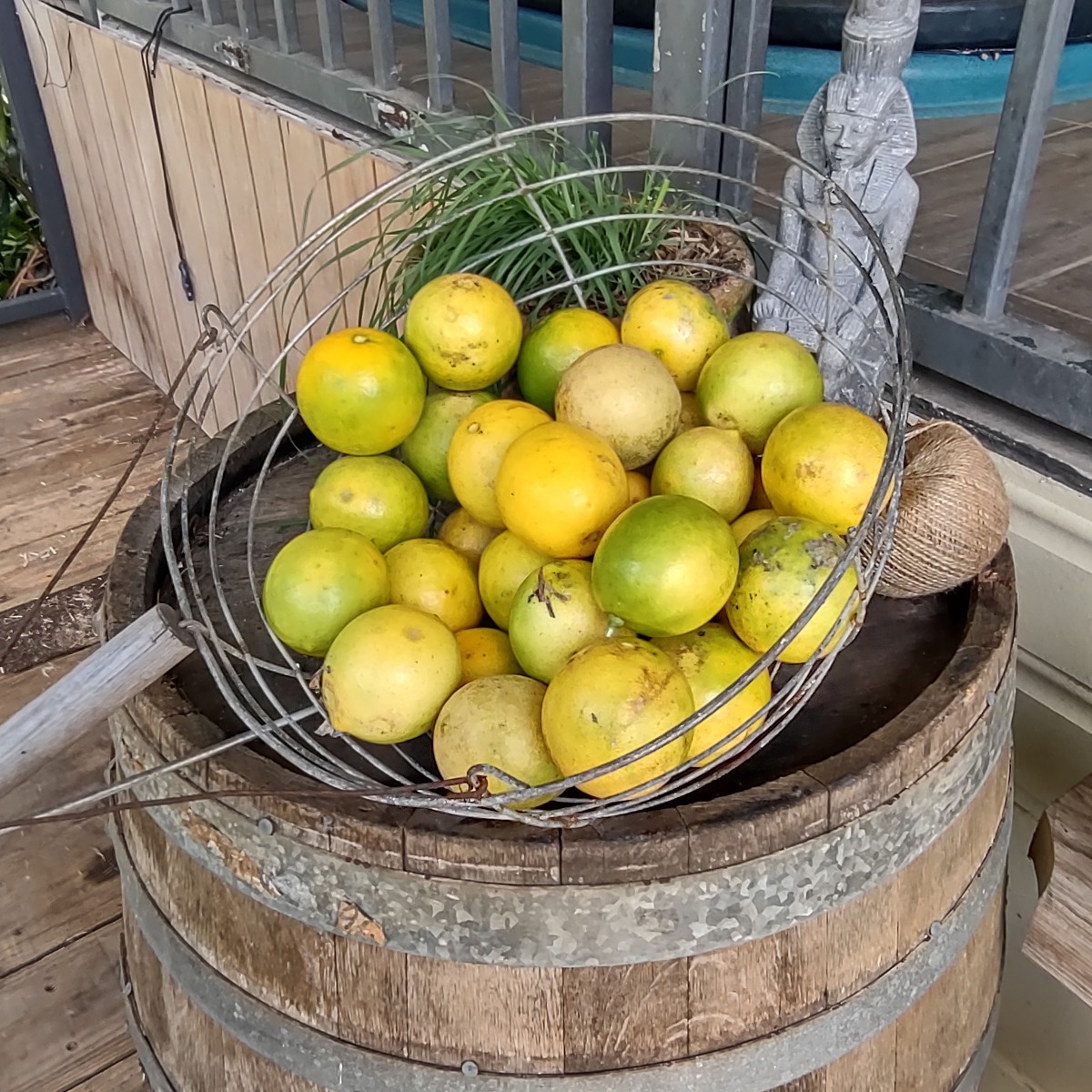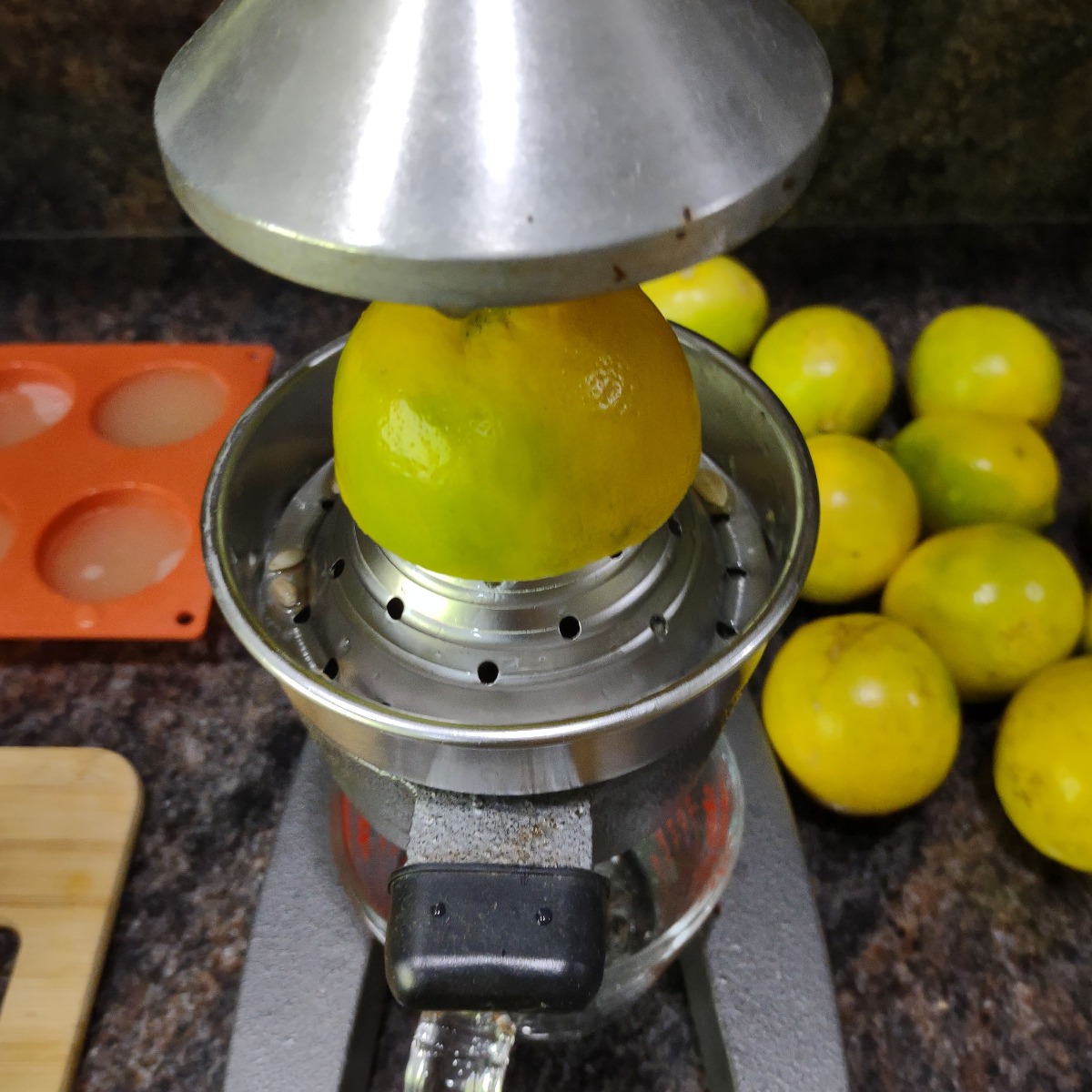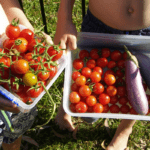This post may contain affiliate links.
Yes, you can freeze lemons. You can freeze lemons whole, halved, sliced, as zest or juice. The way in which you freeze lemons must be determined by what you plan to use the frozen lemon for. This posts talks about the various ways to freeze lemons, and uses of frozen lemon of all kinds. Lemons are one of the most prolific food crops we grow here on the homestead, if you freeze some of your lemon crop you will never need to buy lemons or lemon juice again!

Sometimes too, it’s easier to reach for ready-prepared lemons in the freezer than to go outside, pick one, and start from scratch. Freezing lemons, in various ways, can be part of your meal prep. Our lemon-picking device (pictured) is pretty awesome for any high-up lemons too, but mostly our citrus trees are low-growing by design, we prune them to be low enough to pick easily.
What to do with all those lemons? Lemons can be preserved in many ways. You can make marmalade, lemon curd (if you also have excess eggs), dehydrate them, pickle them and preserve them in salt. But in this post we’re all about freezing your lemon harvest!

You can also freeze limes, oranges, and grapefruit, the same methods apply to most citrus.
Freeze Whole Lemons
Before freezing lemons, give them a good scrub to get any dirt or contaminants off the skin. I do this in the kitchen sink with dish soap (eco, no nasties) and a kitchen scourer before rinsing them well and setting them on the drainer to dry.
Once dry, freeze them spaced out on a tray in your freezer. Once frozen transfer them to a freezer box or large freezer bag. We used to use silicon bags but found them difficult to wash and dry and they eventually because smelly and stained. As more evidence comes out about the potential toxicity od silicone, we’ve gone back to plastic food-safe freezer bags. Who knows what’s best these days?
Glass freezer to oven dishes work well too, we have lots of those, but none big enough for lemons.
What can you do with frozen whole lemons? Well, I put them inside a chicken when I’m roasting them for a lovely lemon/herb/garlic gravy. I also use them as a pectin source when I’m making jam. If you leave the whole lemons to defrost you can get a good amount of juice from them. They won’t be any good for testing or slicing as the inside and skin of the lemon will be soft and mushy after freezing.
To defrost the whole lemons, either just leave them on the counter to defrost, or defrost faster in cold water. If using a microwave to defrost, be very careful, they could maybe explode. We don’t own a microwave so I haven’t tried!
Allegedly, lemons only keep for 4 months in the freezer, but the source I found for this wasn’t very authoritative. I’ve kept lemons in the freezer for longer than this.
Freeze Lemon Juice
You can freeze lemon juice in individual portions to add to cooked recipes, salad dressing, drinks, and more. This method is good if you also want to freeze the lemon zest.
First, give your lemons a good scrub. Then remove the zest with a zesting tool.
There are now multiple ways to juice your lemons. If you have to deal with a lot of citrus fruit, as we do, a bench-top juicer is stylish and easy. They’re not the cheapest option, but good tools should last a lifetime. We use a heavy duty stand juicer, and we love it! It’s in use all year as our various citrus come into fruit, for a quick drink, or bulk processing.
Once you’ve juiced your lemons, filter it through a sieve or clean kitchen muslin to remove any fragments of pips. You can then freeze the lemon juice into individual portions. I have used silicone trays, in various sizes for different portions. These silicone trays are also useful for freezing egg whites, yolks, or whole eggs for winter use. I’m not sure if I want to use them today.
Freeze Lemon Zest
After washing your lemons very well, and drying, use a testing tool to microplane the yellow jest from the white pith beneath. Spread the zest over a non-stick tray (use baking parchment or a baking mat) and place in the freezer. Once frozen break up your sheet of lemon zest and store in a silicone freezer bag, plastic bag, or freezer box.
If freezing lemon zest you could also freeze it in an ice cube tray (without water) or in the silicone trays we mention for juice, above. The aim is to keep the zest broken up, not to freeze it in a big clump. You’ll want to use it in small amounts, keeping the remainder in the freezer and with a big clump, that will be impossible.
Freezing Half Lemons
Yes, you can freeze half lemons although you may lose some juice in the process. Freeze them separately, skin side down, on a tray, before putting the frozen lemons into silicone freezer bags, as above. Obviously, you could quarter them too.
Freezing Lemon Slices
Yes, you can freeze lemon slices, but again, you will lose some juice. This is the best way to prep and store lemons to add to a jug of water or a drink in a glass. You’ll get some lemony flavour, plus a ready-made ice block.
To freeze lemon slices give your lemons a good scrub to remove all dirt and bacteria. Rinse and dry well before slicing.
In this case, you’ll need to freeze the slices laid flat, separately, on a non-stick surface such as baking parchment or a baking sheet.
Thanks for visiting our site and thanks for growing lemons. The more of us growing our own food, the better the world becomes. Other content you may like:
- Growing grapefruit trees (very similar to growing lemon trees)
- Mulberries, trees, fruit, leaves.
- Papaya (aka paw paw)
- Food plants that grow in the tropics
- Our farm or homestead
- Shop
- Tropical Vegetables
Have fun freezing lemons! There are other ways to preserve citrus and lemons, coming soon!







